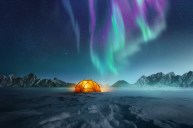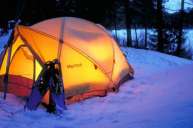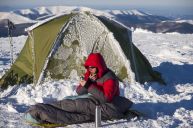Camping in winter conditions should never be taken lightly, especially if it's your first-time cold weather camping. From heavy snow to freezing sweat, winter campers have their work cut out for them and then some. Fortunately enough, there's many winter camping gear available to help modern camping enthusiasts reduce hazards the cold outdoors will have in store.
Whether you're a backpacker or car camper, the following winter camping tips are sure to help you along.
Dressing for Winter Camping
https://www.instagram.com/p/CQgeeN-tc3l/
Base Layer: Layering is one of the easiest ways to prepare yourself for a winter camping trip. Inexpensive and straightforward items like water-resistant long underwear and extra socks can be literal lifesavers when high winds and cold temperatures combine. Multiple layers you can quickly put on and take off will help you moderate your body temperature as needed, which you'll want if you're getting physical.
Jackets: So many jackets to choose from, right? Not all of them do as well from one cold-weather situation to another. While down jackets are a warm, lightweight, and popular option, they might not be the best if you're expecting damp conditions, as they aren't always water-resistant. Often, your best bet is a 3-in-1 jacket with a waterproof shell and provides versatile combinations to address different situations.
Footwear: Not just any hiking boots will do when it comes to cold weather. For instance, you can't just buy oversized galoshes, put on three pairs of socks, and hope for the best (sadly, we speak from experience). For those who plan to romp around in loose snow and other winter landscapes, be sure to get some serious snow boots if you want to come home with all your toes.
Gloves: While you might prefer the look of simple knitted mittens, you don't want melting snow to leak onto your hands where it might refreeze. If you're camping outdoors in cold weather conditions, consider getting some dedicated snow gloves that are both waterproof and insulated.
Headgear: The notion that you lose 80% of your body heat through your head and feet is nonsense. But it's still a good idea to take measures that will keep your facial extremities warm. Plenty of people have lost a nose or earlobe to frostbite. From earmuffs and scarves to all-in-one neck gaiters, many viable options are also great for layering.
Tent Camping in Winter
https://www.instagram.com/p/CQSTZaZBdjY/
RELATED: Sleeping Bags 101: Choosing the Right One for Your Next Adventure
Winter Tents: Not just any tent will cut it when it comes to maintaining sufficient body heat. When Winter nights arrive, temperatures drop, so don't skimp on purchasing a dedicated four-season tent. While you're shopping, get a tent tarp you can set your winter hovel up on to keep moisture out while insulating yourself from the frozen ground.
Sleep Systems: As we often point out, camping is a matter of sleeping, and how well you sleep directly affects how well your outdoor adventure will go. This being the case, make sure to plan where your sleeping arrangement is concerned. Whether you're backpacking through the backcountry or car camping in your favorite state park, you'll want to have a sleeping pad with an appropriate R-value to provide both comfort and insulation. And that sleeping bag liner will let you vary your sleeping temperature accordingly. Of course, just as with tents, be sure to get a sleeping bag that's been designed to withstand 4-season conditions.
Hot Water Bottles: Hot water bottles are an excellent way to warm up your sleeping bag and keep your feet toasty at night. Just be sure not to burn your hands when filling yours up.
RV Camping in Winter
https://www.instagram.com/p/CJRM0tLrxrR/
While RV campers don't have to worry about all the same things that tent campers do when overnighting in cold conditions, they have their matters to consider. These include but are not limited to insulation upgrades, plumbing winterization, engine issues, and more. RV and trailer owners should contact their vehicle retailers and manufacturers to address these safety concerns safely and thoroughly for more information. Believe us; if you're driving cross-country from one national park to another as temperatures drop into the single digits, you'll be glad you did your legwork.
Final Pro Tips
https://www.instagram.com/p/B9BP7fSnukS/
Along with all the basics discussed above, don't forget to attend to the other little things that could make a northern camping trip go south. After all, camping in cold weather conditions isn't just about buying the right gear. For instance, do you have a way to make sure your drinking water doesn't freeze? Also, have you considered using a headlamp instead of a flashlight so you can keep your hands somewhere warm? Thinking ahead and doing your research can save you a lot of headaches and keep you out of harm's way.
Finally, always avoid using any heat source or cooking device that runs on white gas or propane while inside a tent, RV, or any other enclosed area that isn't adequately vented. They tend to emit CO2, which can cause asphyxiation.
Any important Winter camping tips you think we should add? Give us your hot take on our Wide Open Roads Facebook!




